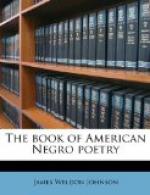These lines are, no doubt, one of the many versions of the famous “Blues.” They are also crude, but they go straight to the mark. The last two lines move with the swiftness of all great tragedy.
In spite of the bans which musicians and music teachers have placed on it, the people still demand and enjoy Ragtime. In fact, there is not a corner of the civilized world in which it is not known and liked. And this proves its originality, for if it were an imitation, the people of Europe, at least, would not have found it a novelty. And it is proof of a more important thing, it is proof that Ragtime possesses the vital spark, the power to appeal universally, without which any artistic production, no matter how approved its form may be, is dead.
Of course, there are those who will deny that Ragtime is an artistic production. American musicians, especially, instead of investigating Ragtime, dismiss it with a contemptuous word. But this has been the course of scholasticism in every branch of art. Whatever new thing the people like is pooh-poohed; whatever is popular is regarded as not worth while. The fact is, nothing great or enduring in music has ever sprung full-fledged from the brain of any master; the best he gives the world he gathers from the hearts of the people, and runs it through the alembic of his genius.
Ragtime deserves serious attention. There is a lot of colorless and vicious imitation, but there is enough that is genuine. In one composition alone, “The Memphis Blues,” the musician will find not only great melodic beauty, but a polyphonic structure that is amazing.
It is obvious that Ragtime has influenced, and in a large measure, become our popular music; but not many would know that it has influenced even our religious music. Those who are familiar with gospel hymns can at once see this influence if they will compare the songs of thirty years ago, such as “In the Sweet Bye and Bye,” “The Ninety and Nine,” etc., with the up-to-date, syncopated tunes that are sung in Sunday Schools, Christian Endeavor Societies, Y.M.C.A.’s and like gatherings to-day.
Ragtime has not only influenced American music, it has influenced American life; indeed, it has saturated American life. It has become the popular medium for our national expression musically. And who can say that it does not express the blare and jangle and the surge, too, of our national spirit?
Any one who doubts that there is a peculiar heel-tickling, smile-provoking, joy-awakening, response-compelling charm in Ragtime needs only to hear a skilful performer play the genuine article, needs only to listen to its bizarre harmonies, its audacious resolutions often consisting of an abrupt jump from one key to another, its intricate rhythms in which the accents fall in the most unexpected places but in which the fundamental beat is never lost in order to be convinced. I believe it has its place as well as the music which draws from us sighs and tears.




